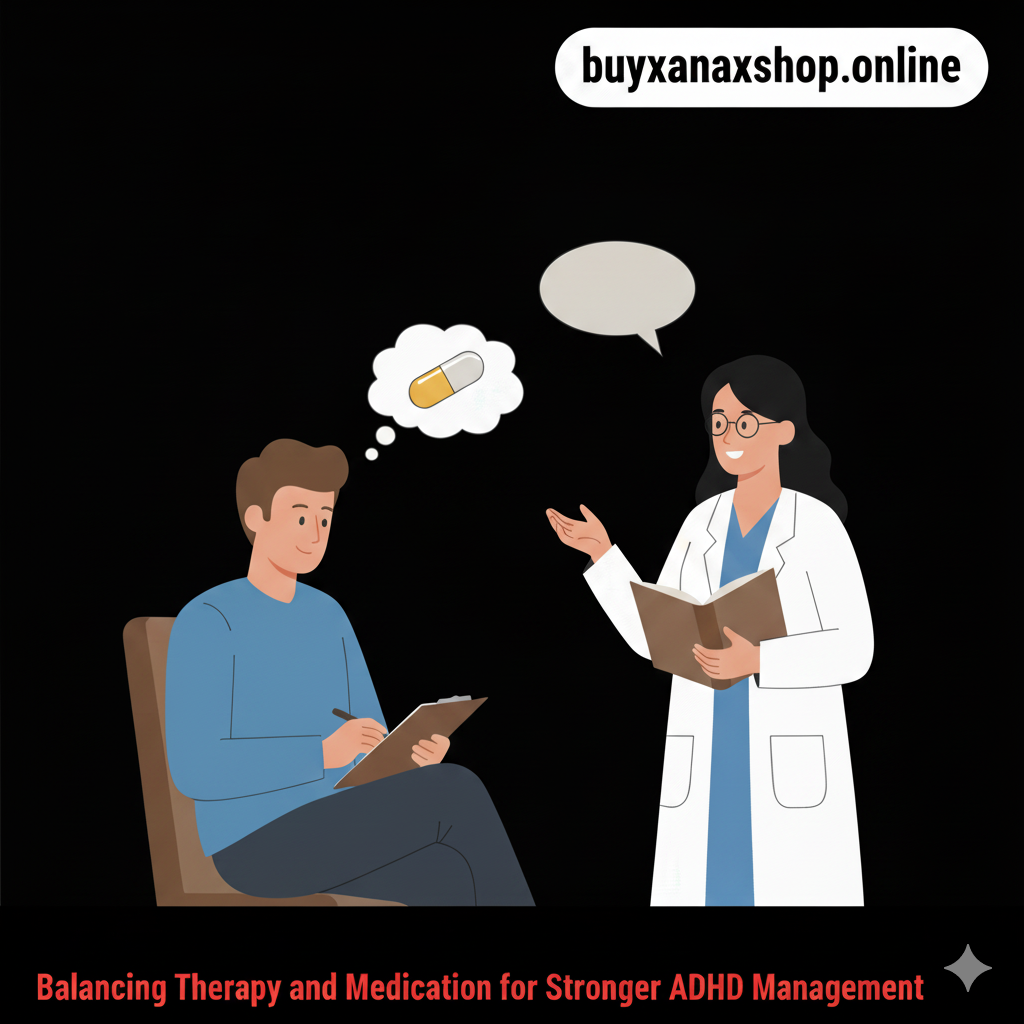
Table of Contents
Managing Attention-Deficit/Hyperactivity Disorder (ADHD) requires more than a single solution. Patients often find that the most effective approach combines both behavioral therapy and medication. While stimulant medications like Buy Adderall online or non-stimulants such as Strattera directly influence brain chemistry, therapy provides essential tools for managing daily challenges. This guide explores how medication and therapy complement one another, helping individuals achieve better focus, organization, and overall quality of life.
Understanding ADHD and Its Challenges
ADHD is a neurodevelopmental condition that affects both children and adults. It often presents as difficulty with attention, hyperactivity, and impulsivity. Left untreated, ADHD can interfere with school, work, and relationships.
- Children may struggle with classroom performance.
- Adults often face problems with organization, productivity, and time management.
- Both groups may experience emotional difficulties, including frustration and low self-esteem.
Why Treatment Requires More Than One Approach
No single treatment works for every patient. While medication targets neurochemical imbalances, therapy focuses on behavioral and emotional management. Together, they create a more comprehensive treatment plan that addresses both symptoms and coping strategies.
The Role of Medication in ADHD Treatment
How Stimulants Work
Medications like Buy Adderall Online and Ritalin increase dopamine and norepinephrine levels in the brain. This helps improve focus, attention span, and impulse control.
Non-Stimulant Options
Some patients cannot tolerate stimulants or may prefer alternatives. Options include:
- Atomoxetine (Strattera): Works by increasing norepinephrine.
- Guanfacine XR (Intuniv) and Clonidine XR (Kapvay): Help with hyperactivity and impulsivity.
? Learn more about Adderall’s effects on focus and attention.
Benefits and Risks
- Benefits: Improved focus, reduced impulsivity, and better academic/work performance.
- Risks: Potential side effects such as appetite loss, insomnia, or cardiovascular issues.
The Role of Therapy in ADHD Treatment
Behavioral Therapy
Behavioral interventions focus on reinforcing positive behaviors while reducing unwanted ones. This is especially effective for children, but adults can also benefit.
Examples include:
- Parent training for structured routines
- Classroom behavior plans
- Reward systems for positive reinforcement
Cognitive-Behavioral Therapy (CBT)
CBT helps individuals reframe negative thinking patterns, reduce procrastination, and manage emotional regulation.
Coaching and Skill-Building
ADHD coaching teaches practical skills such as:
- Time management
- Task organization
- Goal setting and accountability
? Explore more about behavioral strategies alongside medication.
Why Combining Therapy and Medication Works Best
Studies show that combining therapy with medication often produces the most effective results. While medication addresses core symptoms, therapy provides skills for long-term management.
- Medication → Reduces impulsivity and distractibility.
- Therapy → Builds coping skills, emotional control, and strategies for everyday success.
This dual approach helps patients not only perform better but also feel better.
Lifestyle Modifications as an Added Layer
Along with therapy and medication, lifestyle choices make a significant difference in ADHD management:
- Exercise: Improves focus and regulates mood.
- Sleep: Essential for attention and behavior control.
- Nutrition: Balanced meals help reduce energy crashes and mood swings.
- Mindfulness practices: Meditation and relaxation techniques reduce stress.
? Check out our guide on ADHD lifestyle changes that support treatment.
When to Consider Treatment Adjustments
If one approach isn’t providing the expected results, patients may need to:
- Adjust dosage under medical supervision.
- Switch from stimulants to non-stimulants.
- Incorporate more structured therapy.
Open communication with healthcare providers is key to finding the right balance.
Conclusion
The most successful ADHD treatment plans recognize that therapy and medication work best together. Medication helps balance brain chemistry, while therapy builds long-term coping strategies. Lifestyle choices further support these interventions, creating a holistic plan tailored to each individual’s needs.
By understanding the role of both therapy and medication, patients and families can confidently collaborate with healthcare providers to build an effective, sustainable treatment plan for ADHD.
Frequently Asked Questions (FAQ)
1. Can ADHD be treated without medication?
Yes. Many patients benefit from behavioral therapy, cognitive-behavioral therapy (CBT), and lifestyle changes such as exercise, sleep regulation, and structured routines. For mild ADHD, therapy alone may be effective, but many individuals see the best results when therapy is combined with medication.
2. What is the most common medication for ADHD?
Stimulant medications like Adderall (amphetamine/dextroamphetamine) and Ritalin (methylphenidate) are the most commonly prescribed. For those who cannot tolerate stimulants, non-stimulant options like Strattera (atomoxetine) or Intuniv (guanfacine XR) are available.
3. Is therapy more effective than medication for ADHD?
Neither therapy nor medication is “better” on its own. Medication helps manage core symptoms, while therapy teaches coping strategies and builds long-term skills. Studies show that combining both approaches often produces the best results.
4. How long does ADHD treatment take?
ADHD is a chronic condition, so treatment is often ongoing. Medication can work within hours, but therapy and lifestyle adjustments may take weeks or months to show benefits. The treatment plan may change over time depending on progress and side effects.
- Are there natural alternatives to ADHD medication?
Yes. Regular exercise, mindfulness practices, structured routines, and proper sleep can improve ADHD symptoms. While these methods may not replace medication for everyone, they enhance treatment effectiveness when used alongside therapy or medication.
Purchase Here Use coupon code “SAVE10” to get FLAT 10% Off
Written by Judy Francis

Coupon Code
Use Coupon CodeSALE10
Product Categories
- Buy Adderall Online
- Buy Adipex Online
- Buy Alprazolam Online
- Buy Ambien Online
- Buy Ativan Online
- Buy Carisoprodol Online
- Buy Clonazepam Online
- Buy Codeine Online
- Buy Darvocet Online
- Buy Demerol Online
- Buy Diazepam Online
- Buy Dilaudid Online
- Buy Fioricet online
- Buy Gabapentin Online
- Buy Hydrocodone Online
- Buy Hydromorphone Online
- Buy Klonopin Online
- Buy Lexapro Online
- Buy Lorazepam Online
- Buy Lorcet Online
- Buy Lortab Online
- Buy Meridia Online
- Buy Methadone Online
- Buy Modafinil Online
- Buy Norco Online
- Buy Opana ER Online
- Buy Oxycodone Online
- Buy Oxycontin Online
- Buy Percocet Online
- Buy Phentermine Online
- Buy Roxicodone Online
- Buy Soma Online
- Buy Suboxone Online
- Buy Subutex Online
- Buy Tapentadol Online
- Buy Tramadol Online
- Buy Valium Online
- Buy Viagra Online
- Buy Vicodin Online
- Buy Xanax Online
- Buy Zolpidem Online

Leave a Reply